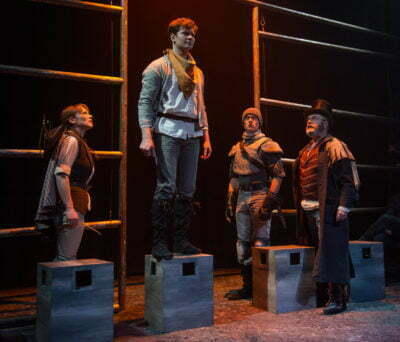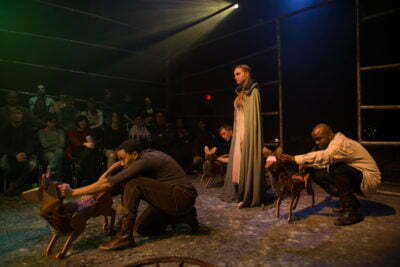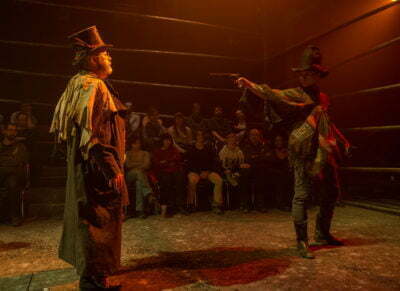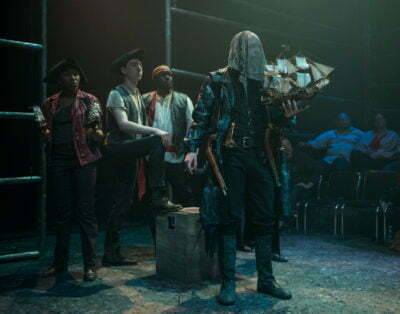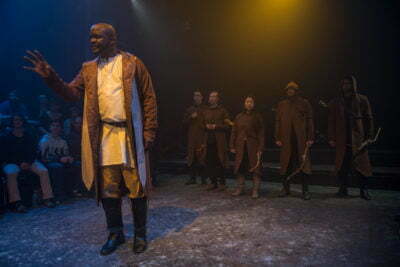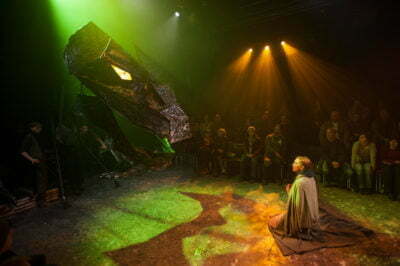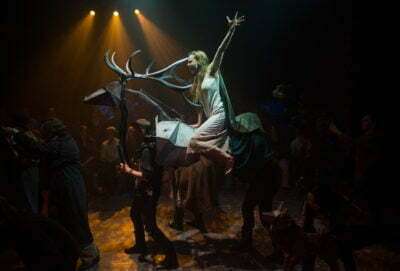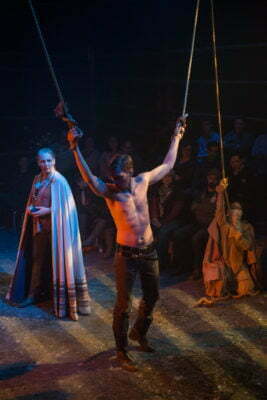The Hammer Trinity
By Nathan Allen and Chris Mathews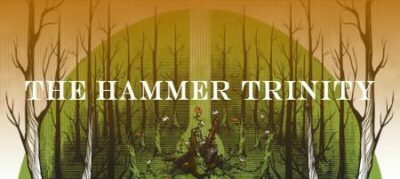
Directed by Nathan Allen
Produced by The House Theatre of Chicago
Epic History Unfolds Through Dialectical Dragons
Though I’ve encountered great hospitality in theatre, I have never seen a production as warm and intimate as The House Theatre’s marathon performance of The Hammer Trinity. It was clear from my interactions with the staff and cast how much they loved this story, as they would have to after all the effort they put into producing it. The Hammer Trinity is told in three parts, and the third is finally enjoying its world premiere. All three are now being performed, and though it is possible to see them in isolation, I highly recommend seeing them in order, because it really is a wonderfully complex story.
In Part One: The Iron Stag King, we were introduced to a magical world that encompasses about a thousand years worth of cool stuff, from cowboys to dragons. The symbol of authority in this world is a hammer, which was formerly wielded by the monarch of the shamanistic inhabitants of the grasslands with the approval of story-telling magician Hap the Golden (William Dick) to create unity under “enlightened” despotism. But then, a dragon named Irek Obsidian (voice of Tracy Letts) encouraged democracy and individualism, and the queen was forced to form a federation with four other regions’ democratically elected representatives, meaning capitalist warlords. But when the queen and the leader of the badlands-roaming cowboy nation fell in love and conceived a child, the balance of power was upset, and they were found murdered. Hap the Golden rescued the child, and sent it far away on an iron stag.
At the beginning of the action, one of the warlords, the foppish kleptocrat Henley Hawthorne (Joey Steakley), is making a push for the old capital city, and Hap returns to collect the now full-grown Casper Kent (Kevin Stangler), heir to the hammer. Henley kills Casper’s foster father, setting Casper off on a Joseph Campell hero’s-journey type quest for the hammer. Hap has acquired companions for Casper who have their own reasons to hate the other two warlords. Reinne Boileau (Kara Davidson) is an archer and chess scholar whose father was murdered by the pirate kingpin Davy Boone (Joe Bianco), while Wilke Forsbrand (JJ Phillips) is an honorable Viking who fought against the fascist Viking dictator Kaelan Wayne (Christopher Hainsworth), who massacred over a hundred thousand grassland children in an attempt to kill Casper. Other characters include Hollow Thom Gadsden (John Henry Roberts), a former member of Kaelan’s death squads, the mysterious July of the Seven Foxes (Kay Kron), a young woman being advised by Irek Obsidian, and the bumbling inventor Pepper Tintype (Ben Hertel). But as Casper draws nearer to the hammer, he realizes how much Hap has manipulated him into the elitist narrative of the hero’s journey, and intends to use him as a puppet tyrant. In fact, Hap is a dragon himself, and the killer of Casper’s parents.
In the following two plays, Casper and his friends attempt to survive in the dangerous political situation, while still retaining some ability to influence events. Part Two: The Crownless King revolves around their conflict with the pirates, while Casper interacts more with July and Irek. He learns of a second prophecy, that someone will lead the anti-monarchy forces, and defects from the state he is head of. However, Irek’s supposed liberalism turn out in reality to be just as tyrannical, and his claimed respect for free will is illusionary, since he manipulates peoples’ circumstances as much as Hap so they will pick what he wants them to. Personal relationships also get more complicated. Hap arranged a marriage between Casper and Reinne, even though she was in love with Wilke, and Casper falls in love with July.
But it is the third play, The Excelsior King, which is new, and it ties up most of the loose ends in a highly satisfying manner. With the friends scattered, and the whole island thrown into war between the two dragons, Kaelan Wayne re-emerges to conquer everyone, and create a world of inequality and perpetual violence to winnow the strong from the weak. His goal is to eliminate fantasy itself, and July must invoke her powers as a budding storyteller to convince everyone of a narrative that provides an alternate synthesis to Wayne’s worst-of-both-worlds. There is also the matter of defeating his industrialized army.
How determined House Theatre is to tell this story! An eighteen member ensemble, as well as pre-recorded lines by Letts as Irek, is accompanied by an amazingly complex design. Director Nathan Allen’s enthusiasm at the press opening was infectious, and while I’m normally irritated by the put-on guffawing by cast members’ friends, this time there was a real sense of community. I think that same atmosphere will be replicated at all the showings, because the show encourages interactions with the cast by having them mingle with the audience during the many breaks. And since they’re such fine actors, audience members will be eager to meet them.
Kevin Stangler, who took over the role of Casper Kent from Brandon Ruiter, has a difficult part. Casper spends much of the play being manipulated by dragons who want to make him a generic fantasy hero, and though he rebels against him, he is unsure whether it would be best for him to remain involved at all. However, Stangler’s charm and moral sensibility make Casper a likable protagonist, and he has strong chemistry with Kay Kron, the actress who plays July and replaces Casper as the main hero in part three. Kron plays July with sincerity, which is a bold choice since she is usually talking to puppets or a disembodied voice, and always manages to form an emotional connection. This ability to play off the environment and her scene partners also allows her to pull of the pedagogical part of the conflict successfully.
Kara Davidson plays Rienne, the archer and chess master, with a French accent and a knack for contemplation. I could sense the character’s discomfort with the very public and traditionally feminine role of queen, but willingness to serve the part, just as she rose to be a ruthless general. It’s a fine acting job that makes this character three-dimensional. JJ Phillips plays the good Viking Wilke with a stoic sense of honor the character earned from rescuing children during Kaelan’s genocide, but is contrasted comically with the Viking uniform of a sweater and snowflake-patterned armor. Other characters explicitly point out his performed hyper-masculinity makes it hard for him to process grief and regret, which becomes less funny as he descends into alcohol and suicidal ideation, but also forms the basis of his bond with Rienne. During a fight scene late in part one, I was impressed by how well Phillips played a character who fought on heroically despite grievous injury, but it turned out he really dislocated his shoulder. Co-author Chris Matthews stepped in to replace him, and though he needed the book and improvised his way out of the fight scenes, his acting was brilliant, and the best example from the night of how much the creative team loves this story.
There are a bunch of other characters made memorable by dedicated actors, and I’ve barely even mentioned a sub-plot revolving around Hollow Thom Gadsden and the fall-out of his involvement with Kaelan Wayne. I will say John Henry Roberts’s performance as Thom was as complex as anybody’s, and with the same ability to play the humor while keeping the story serious. Isabel Liss, as the vengeful leader of the grasslands, coldly demands justice while shrewdly engaging in realpolitik. William Dick’s Hap the Golden is conniving, but charismatic. You know not to trust him, but you can’t help listening to him. The three warlords are all distinctive, with Joe Bianco’s pirate leader Davy Boone counter-intuitively being the most sympathetic, Joey Steakley’s Henley Hawthorne the most funny, and Christopher Hainsworth’s Kaelan Wayne a fitting embodiment of heartless cruelty.
Music composed by Kevin O’Donnell and sound designed by Joshua Horbath helps create the epic atmosphere. While the actors don’t need it to prop up their performances, it does go a long way towards building the feeling of macro-historical struggle and the specificity of this world, as does the lighting by Lee Keenan. Collette Pollard’s set design is a cage around the audience, which wisely represents the theme of narratives while leaving our imaginations to fill in the physical locations. Probably the most memorable design elements are the puppets by Jesse Mooney-Bullock. The dragons are exciting and expressive, but the smaller animals, especially July’s seven foxes, are equally fascinating in the hands of the multi-talented cast. Collette Pollard’s costume designs walk a careful balance between maintaining the fantasy world and inviting the audience in to play along with it. You might have to see Wilke’s sweater and Thom’s enormous hat to know how well they work, but Henley’s eighteenth-century inspired getup is impressive in its audacity.
Nathan Allen is to be commended for directing such a massive work. My understanding is that though the first two parts are basically remounts, they have been revised, and the transition to the third is seamless, displaying a remarkably consistent vision. While some technical failures in part one and Phillips’s injury are regrettable, Allen’s handling of the situation won over the audience, and created a unique feeling of solidarity between audience and performers in parts two and three. Other audiences will likely see understudy Aaron Latterell in the role of Wilke, and if he steps ups as ably as Matthews, they are in for a treat. The meta-theatricality of critiquing Campbell’s monomyth could seem pretentious in less talented and self-aware hands, not to mention nerdy even for theatre. But the company is so inviting, and the story so dynamic, that everything gels into an awesome theatrical experience.
Highly Recommended
Jacob Davis
Reviewed March 7, 2015
The Excelsior King has been Jeff Recommended.
For more information, see The Hammer Trinity’s page on Theatre in Chicago.
Playing at The Chopin Theatre, 1543 W Division Street, Chicago.Tickets for single showings of part 3 are $30, double-features of parts 1 and 2 are $60, marathon performances are $65. To order, call 773-769-3832 or visit www.thehousetheatre.com. Marathon performances of all three parts are Saturdays and Sundays at 2 pm through May 3. Running time is nine hours total with an intermission in part 1, a half hour break before part 2, an intermission in part 2, an hour break before part 3, and two intermissions in part 3. Single showings of part 3 are Fridays at 7:30 pm through May 1, except April 3 and 17. Running time is three hours. Double features of parts 1 and 2 are April 3 and 17 at 7:00 pm. Running time is five hours and fifteen minutes.

